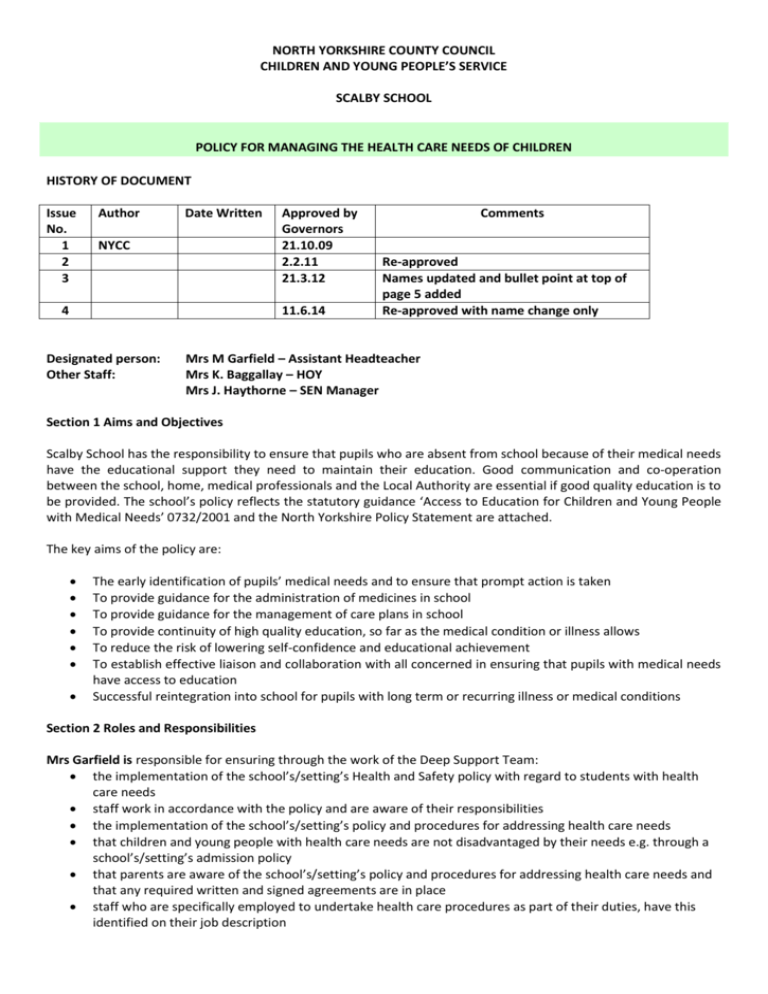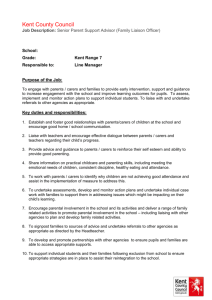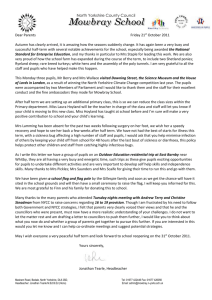NORTH YORKSHIRE COUNTY COUNCIL CHILDREN AND YOUNG
advertisement

NORTH YORKSHIRE COUNTY COUNCIL CHILDREN AND YOUNG PEOPLE’S SERVICE SCALBY SCHOOL POLICY FOR MANAGING THE HEALTH CARE NEEDS OF CHILDREN HISTORY OF DOCUMENT Issue No. 1 2 3 Author Date Written NYCC 4 Approved by Governors 21.10.09 2.2.11 21.3.12 11.6.14 Designated person: Other Staff: Comments Re-approved Names updated and bullet point at top of page 5 added Re-approved with name change only Mrs M Garfield – Assistant Headteacher Mrs K. Baggallay – HOY Mrs J. Haythorne – SEN Manager Section 1 Aims and Objectives Scalby School has the responsibility to ensure that pupils who are absent from school because of their medical needs have the educational support they need to maintain their education. Good communication and co-operation between the school, home, medical professionals and the Local Authority are essential if good quality education is to be provided. The school’s policy reflects the statutory guidance ‘Access to Education for Children and Young People with Medical Needs’ 0732/2001 and the North Yorkshire Policy Statement are attached. The key aims of the policy are: The early identification of pupils’ medical needs and to ensure that prompt action is taken To provide guidance for the administration of medicines in school To provide guidance for the management of care plans in school To provide continuity of high quality education, so far as the medical condition or illness allows To reduce the risk of lowering self-confidence and educational achievement To establish effective liaison and collaboration with all concerned in ensuring that pupils with medical needs have access to education Successful reintegration into school for pupils with long term or recurring illness or medical conditions Section 2 Roles and Responsibilities Mrs Garfield is responsible for ensuring through the work of the Deep Support Team: the implementation of the school’s/setting’s Health and Safety policy with regard to students with health care needs staff work in accordance with the policy and are aware of their responsibilities the implementation of the school’s/setting’s policy and procedures for addressing health care needs that children and young people with health care needs are not disadvantaged by their needs e.g. through a school’s/setting’s admission policy that parents are aware of the school’s/setting’s policy and procedures for addressing health care needs and that any required written and signed agreements are in place staff who are specifically employed to undertake health care procedures as part of their duties, have this identified on their job description appropriate training, guidance, supervision and insurance cover is in place for any member of staff who either voluntarily or contractually administers medication or undertakes health care procedures that relevant staff are informed of any child/young person in their care with health care needs, the nature of the condition, any additional support/procedures that may be required and what action to take should an emergency arise Mrs Baggallay and Mrs Haythorne (Students with SEN) are responsible for ensuring that: All school/setting staff that either volunteer or are contracted to undertake agreed health care All staff follow the school’s/setting’s policies and procedures when addressing All staff are aware of health care needs All staff attend and take note of required training All staff follow agreed health care procedures All staff report any concerns That Health care plans are reviewed with all parties on an annual basis That the appropriate liaison with the School Nurse ( or other relevant body) takes place That new Health Care plans are in place within 4 weeks of diagnosis That Health Care plans are effectively monitored on transition. Parents and Carers Parents and carers have prime responsibility for their child’s health and should: inform the school/setting that their child attends of any relevant medical information about their child’s health care needs be involved with health professionals and the school/setting in the drawing up of any Health Care Plan that may be needed for their child provide up-to-date emergency contact details work with their child’s school/setting to establish agreed health care procedures ensure provision of agreed medical resources specific to their child e.g. medication if their child is absent from school for medical reasons, be involved with school/other education provider and health professionals to enable continuity of education during the period of absence and to draw up reintegration plans provide written consent for any health care procedures that, following consultation with parents/carers, the school/setting has agreed to undertake Children and Young People Whenever appropriate and possible, children and young people should be encouraged to undertake an active part in both the planning and the management of their own health care needs and also in the drawing up of any required Health Care Plans. They should be encouraged to act as independently as they are able and undertake as much of their own care as is practicable. Other Agencies The School Nurse, will notify the school of the need for students to have a Health Care Plan and will act as the gateway for information from other Health Professionals such as: Health Services The Strategic Health Authority (SHA) has the overall responsibility for managing, monitoring and improving local health services. The National Health Service is run at a local level by different authorities and trusts. Acute Trusts manage hospitals and make sure they provide high quality health care. (Acute Trusts, through arrangements with the Local Authority, facilitate continuity of education for school aged children/young people who have to spend a period of time in hospital.) Primary Care Trusts (PCT’s) have a statutory duty to make sure that there are services to meet local needs. They work with the Strategic Health Authority, Acute Trusts and with Local Authorities and other agencies, to provide health care within the local community. Individuals/services from both the Primary Care and Acute Trusts work with schools and settings to support the health care needs of children/young people. Examples of these are: The School/Community Health Services These are for many the first and main point of contact. These services can, for example provide advice on health issues, support the drawing up of Health Care Plans, provide training, undertake health care programmes and in some situations provide specialist support for individual children/young people. The Child and Adolescent Mental Health Service (CAMHS) Many children and young people who have complex health needs, life limiting illnesses, traumatic accidental injury or who have been absent from school for significant periods for medical reasons may need psychological and emotional support to address issues related to stress and/or mental health problems. The General Practitioner (GP) A GP may be involved as part of the Primary Health Care Team. In most circumstances, however, schools and settings should seek information and advice from either the Community Health Team or the School Health Service, as appropriate. Parents/carers who are new to an area should be encouraged to register their child with a GP as soon as possible. Other Health Professionals Other health professionals may also provide care, advice, information and training e.g. specialist nurse, health visitor, physiotherapist, occupational therapist. Section 3 Managing Absence and making provision for students with Healthcare needs: These students may need additional support to ensure they keep pace with their peers and do not suffer from gaps in their learning. Scalby School’s system for ensuring their needs are met are as follows: Stage 1 – Up to 15 days Using the Scalby School Attendance Tracker, the Attendance Officer will monitor all pupils with medical conditions on a weekly basis. For absences of 15 days or less that are not part of a pattern of a recurring illness, she will liaise with the Head of Year and pupil’s parents to provide homework as soon as the pupil is able to cope with it and ensure continuity of learning. If the student has a recurring illness or chronic condition already known to the school, referral to the Local Authority will take place before 15 days and an application for Outreach Tuition will be made at the next IAP panel. Stage 2 – After 15 days Liaising with the Education Social Work Service regarding all pupils expected to be absent from school for 15 working days or more (including time in hospital) and make a referral as soon as possible to the Local Authority for support in making educational provision for the pupil through the IAP panel. In the mean time, through allocation of Outreach tuition available to the school, Education to provided at an appropriate level at hospital or at home. These students will then receive the educational code B which is an approved educational activity, rather than M which indicates an absence Stage 3 – Ensuring quality of provision Mrs Haythorne, will ensure Ensure that the Outreach service has access to the planning and assessments in all national curriculum subjects which the pupil is studying within 5 working days and work programmes on a termly basis where appropriate Liaise with the designated home tutor regarding the action plan as agreed at planning and review meeting Make available to the Home tutor, Individual Education Plans, Personal Education Plans and Health Care Plans where appropriate Supply hospital teachers with background information on the child or young person and liaise to ensure that work set at an appropriate level for long and recurring admissions to hospital Monitor provision, progress and reintegration arrangements Ensure that pupils not able to attend school because of medical needs have access to public examinations. Write a Wave 3 risk assessment to ensure both students and staff are safe during tuition Ensure that views of pupils and their parents/carers are taken into account Ensure that arrangements are in place to comply with procedures set out in the SEN Code of Practice where applicable Promote equality of opportunity for pupils with medical needs having due regard for their duties under the DDA Act 2005 Section 4 Ensuring Academic Progress for students with Health Care Needs In addition to the measures above, students with Health Care Needs are vulnerable to impaired academic progress compared to their peers. Each student with Health Care Needs receives a progress report every six weeks called Praising Stars ©. This allows parents and carers to track progress and effort in every subject. This report is used by the Head of Year in each Year group to track the progress of vulnerable groups and to liaise with the SEN Manager, Parents and tutors to ensure that the provision in place is effective and to address any issues.





![afl_mat[1]](http://s2.studylib.net/store/data/005387843_1-8371eaaba182de7da429cb4369cd28fc-300x300.png)

